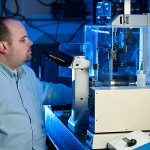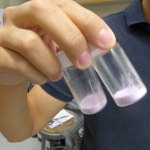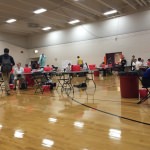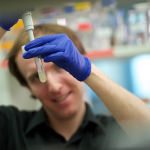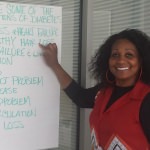Category Health & Wellness
Alumnus’s startup seeks more precise screening for prostate cancer
Success will take years, but if the noninvasive screening test works, it could aid in early detection of a cancer that kills about 26,000 American men every year.
Study links changes in collagen to worse pancreatic cancer prognosis
The study reinforces growing evidence that collagen, which forms fibrous networks in skin, tendons and muscles, is intimately involved in several cancers.
Meningitis vaccines for students at the SERF continue today
Students 25 and under are urged to stop by the SERF and get the vaccine - it's fast, friendly and free.
UW-Madison confirms two cases of meningococcal disease B
University of Wisconsin–Madison confirms that both students hospitalized with meningococcal disease last week had serogroup B. Additional genetic testing is still being conducted to determine if the two bacteria are closely related. Both students are recovering.
UW-Madison to launch online Master’s in clinical nutrition to meet growing demand
The University of Wisconsin System Board of Regents has approved an online master of science degree with a focus on clinical nutrition, among the first of its kind in the U.S.
Some brains are blind to moving objects
As many as half of people are blind to motion in some part of their field of vision, but the deficit doesn’t have anything to do with the eyes.
Yeast knockouts peel back secrets of cell protein function
The study provided a level of detail not available even five years ago. Improved technology cut the time to analyze all the proteins in a yeast sample from four hours to one hour.
Vaccine trial aims to make flu season safer for heart patients
A network of researchers in the United States and Canada will try to spare thousands of patients the dangers of heart attacks and hospitalizations over the next five years in a trial of a high-dose flu vaccine.
UW spinoff helps boost new crop in cranberry country
Some Wisconsin cranberry farmers have started growing aronia, a fruit that is sometimes touted, in this nutrition-conscious era, as the "next superfruit." A UW–Madison spinoff is helping explain aronia's benefits.
A visual nudge can disrupt recall of what things look like
The connection between visual knowledge and visual perception challenges widely held theories that visual information about the world is stored abstractly.
Innovative program helps state residents living with diabetes
Healthy Living with Diabetes classes are offered throughout the state by the Wisconsin Institute for Healthy Aging with support from the UW–Madison Health Innovation Program. They help people manage their diabetes with practical advice delivered by trained leaders, many of whom have diabetes.
Study: Some women need more frequent mammograms
One size doesn’t fit all women in clothing, and neither should all women have mammograms on the same schedule, a new national study concludes.
Study to probe how concussion affects young athletes’ academic performance
Researchers from the School of Nursing and School of Medicine and Public Health are launching a pilot study aimed at teasing out the academic effects of concussions on younger athletes. “There is a substantial gap in our knowledge about what is going on with concussion at the high school level and younger,” explains researcher Traci Snedden.



